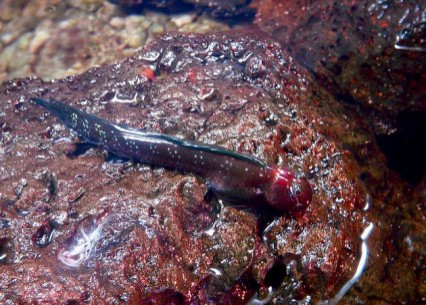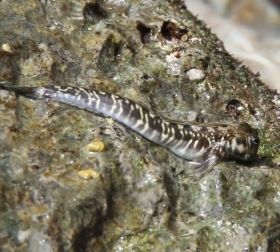The Pacific Leaping Blenny: A Creature Of Peculiar Habits, This Fish Prefers Land Over Water, Hops Like A Frog, And Uses Camouflage To Surprise Prey, Confuse Predators

A strange fish that lives on land and leaps like a frog, has been found to use camouflage to evade predators such as crabs, lizards and birds, a new study says, and according to the researchers, this peculiar type of fish, called the Pacific leaping blenny, can provide a glimpse into each stage of the creature's adaptability to land.
Terry Ord and Courtney Morgans, researchers at the University of New South Wales, studied five-color varieties of the blennies (Alticus arnoldorum) in their natural habitat on the tropical island of Guam.
“This terrestrial fish spends all of its adult life living on the rocks in the splash zone, hopping around defending its territory, feeding and courting mates,” Ord said, in a release. “They offer a unique opportunity to discover in a living animal how the transition from water to the land has taken place.”

The scientists also found that the predatory blennies adapt to the rocky surroundings they live in, and each color variety made best use of its camouflage by choosing to live in a rock that best matched its body color.
“The fish’s body color is camouflaged to match the rocks, presumably so they aren’t obvious to predators,” Ord said.
Researchers also tested how much the blennies benefit from their camouflaging abilities by placing realistic-looking plasticine models of the fish in rocky terrains where they live, and on the sand at a nearby beach where they would be easily visible to predators.
“After several days we collected the models and recorded how often birds, lizards and crabs had attacked them from the marks in the plasticine. We found the models on the sand were attacked far more frequently than those on the rocks,” Ord said.
Blennies are unique as they prefer to live on land, and they use a hopping motion to move around, which they achieve by twisting their tails. The fish grow to be about four to eight centimeters long, and need to stay moist to be able to breathe through their gills and skin.
© Copyright IBTimes 2024. All rights reserved.






















